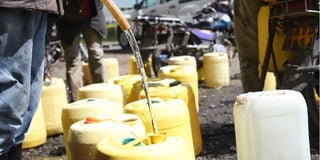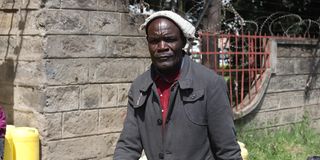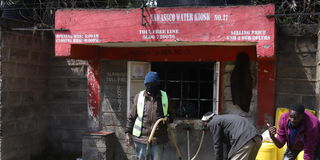Nakuru vendors hit hard by water price hike

A water vendor fills up a 20 liter water jerry can with water at Nawassco water kiosk at Kenya Redcross along Ronald Ngala street on July 14,2025.
Nakuru residents are set to dig deep into their pockets after the Nakuru Water and Sanitation Services Company Ltd (NAWASSCO) announced their new tariffs effective July 1, 2025.
Among those affected are water vendors in the city after the price of a 20-litre jerrican shot up to five shillings from the previous three shillings.
In an interview with Jareld Malingu, a water vendor for 20 years, he notes that the move is a big blow to them after they received a notice three days ago on the adjustment in water prices.

Jareld Malingu, a water vendor for 20 years, explains the current hardship they are facing since Nawassco raised the price of a 20 liter jerry can to five shillings from three shillings.
“I buy water at the Nawassco water kiosk at the Red Cross compound. When I came yesterday morning, I found a notice on the water price increase. I am surprised since most were not involved in the public participation,” he notes.
Malingu says when he started the business, a 20-litre jerrican cost two shillings. Thereafter, the price was maintained at three shillings for more than five years before this week’s adjustment to five shillings.
According to him, it is hard to convince clients to buy the 20L jerry can at twenty-five and thirty shillings.
He states currently most business people prefer carrying water from home rather than buying from him.
“The situation is dire to an extent clients are forced to take water on credit from me, and because the number of those willing to purchase is shrinking by the day, I am forced to agree. More to it, some food outlets want to exchange the water with a meal,” he laments, saying a businessperson would offer to maybe cancel out a plate of githeri with two jerricans of water, something he says is not sustainable for business.
Echoing his sentiments, Hawaya Murunga notes that it is a tough time for them now that they have to meet the new additional water cost both at home and in their daily jobs.

Nawassco water kiosk at Kenya Redcross, along Ronald Ngala street on July 14,2025 where several vendors are buying water to resell in various business and homesteads.
According to him, water is the most used household commodity. The demand is high, however, no client is willing to meet the supply cost at the moment.
“I have to find a way to balance my books. Remember, I need to meet the fuel cost for my motorbike and also the additional water charge, yet my clients are still adamant about buying a 20-litre jerry can at twenty shillings. Before, I would take home Sh 1,000 at this moment, getting Sh 750 by the end of the day is a real hustle,” he says, noting if he continues to see a downward curve in his earnings, he is worried about the days to come.
Murunga explains that to earn Sh 600 in a day, he has to sell 50, 20-litre jerry cans of water to be able to meet both his fuel cost and the cost of purchasing the water to sell to clients.
His request to the Water Service Regulatory Board (WASREB) and NAWASSCO is for a gradual increase in the water tariffs that matches the current economic times.
In a phone call interview, NAWASSCO’s public relations officer, Grace Kabubu, notes that the new tariffs were only communicated to the public after WASREB approved them, further noting that a public participation took place before the tariffs were reviewed.
However, she referred us to WASREB for further details on the tariff adjustments.
By the time of filling this copy WASREB had not given its feedback on the news tariff adjustments communicated to the public by NAWASSCO.

